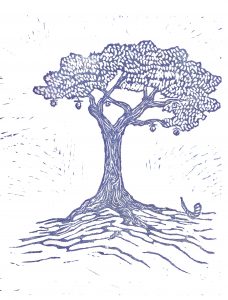The Hill Ḥavurah is a growing, inclusive, and independent Jewish community based on Capitol Hill and serving the larger DC area. This maḥzor is deeply based on one initially created in 2005 by Hill Havurah lay leader Laurie Solnik with assistance from Michael Allen, and was created by Michael Allen and Rabbi Hannah Spiro. This new edition of the Hill Havurah maḥzor had many loving hands on it throughout its creation. We thank Klielle Glanzberg-Krainin for the kavod – honor, care, and hours that she spent bringing all of the pieces together with us. We thank Sarah Burford for her artwork on the front cover and the skill and thought that went into creating it. We thank the Hill Ḥavurah’s Ritual Committee for their thought partnership: Eric Paisner, Marlene Zakai, Erica Pressman, Kelli Raboy, and Jayme Stroud.
This maḥzor is a derivative of many works, which it tries to credit whenever known. It makes what I believe to be fair use of limited and credited excerpts of works not in the public domain, for purposes of education and prayer.

Rabbi’s Welcome
Whether you are intimately familiar with the liturgy of the High Holidays, or are preparing to explore it for the very first time, welcome. Whether you feel most at home with tradition or with boundary-pushing, with verse or with philosophy, with the loud or with the silent, the maḥzor – the High Holiday prayerbook – has room for you. The word maḥzor comes from the Hebrew word “to return.” That’s our goal for these ten days, and the time surrounding them as needed: To return to our best selves, to remember who we truly are, and to be supported in getting there.
This maḥzor is deeply based on one initially created in 2005 by Hill Ḥavurah lay leader Laurie Solnik with assistance from Michael Allen. They adorned the traditional High Holiday liturgy with poetry, songs, reflections, and provocations from across Jewish time. Of critical importance to their effort and to this new version, edited by myself and Michael, is inclusivity – a core value of the Hill Ḥavurah community. We hope this value is reflected in our selection of readings and prayers, transliterations for virtually everything recited in Hebrew, the use of gender-neutral God language, and the attempt to make the maḥzor as easy to follow as possible.
This new edition of the Hill Ḥavurah maḥzor had many loving hands on it throughout its creation. We thank Klielle Glanzberg-Krainin for the kavod – honor, care, and hours that she spent bringing all of the pieces together with us. We thank Sarah Burford for her artwork on the front cover and the skill and thought that went into creating it. We thank the Hill Ḥavurah’s Ritual Committee for their thought partnership: Eric Paisner, Marlene Zakai, Erica Pressman, Kelli Raboy, and Jayme Stroud.
We have attempted to include citation wherever we borrowed texts or unique translations from other sources. We are especially inspired by Kol Haneshamah, the Reconstructionist maḥzor, and that inspiration shows through in many of the translations and texts that we chose.
This maḥzor is yours to use in the ways that are most helpful for your connection to tradition, Torah, and teshuvah – coming back to your best self. Some of the words may be challenging, frustrating, or alienating. Others may be comforting, empowering, or enlightening. Still others may be confusing. Feel free to get stuck in places and stay there if it’s useful; each one of us is on a different journey at this time of year. The core texts of our maḥzor connect us with one another as we go.
Shanah tovah and g’mar ḥatimah tovah – let this New Year be a good one, and may we be inscribed for good.
Rabbi Hannah Spiro,
September 2019, moving into 5780

“📖 The Hill Ḥavurah High Holiday Maḥzor (2019)” is shared through the Open Siddur Project with a Creative Commons Attribution-ShareAlike 4.0 International copyleft license.










Comments, Corrections, and Queries